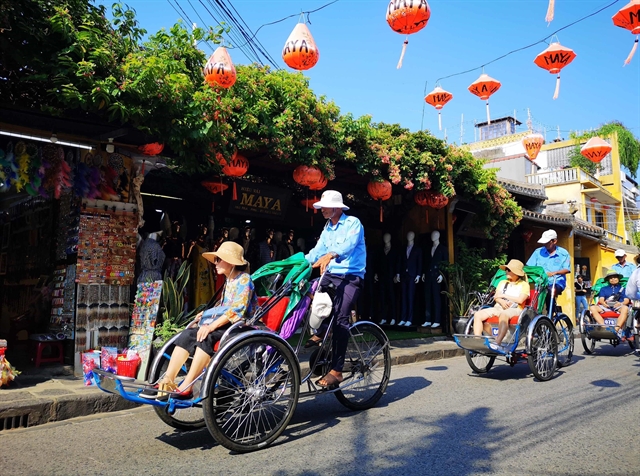Vietnam is slated to resume pre-pandemic bilateral and unilateral visa exemption policies for foreigners when the country fully reopens international tourism on March 15, 2022, announced the spokesperson of the Ministry of Foreign Affairs Le Thi Thu Hang.

Foreign tourists visiting Hoi An City, Quang Nam Province, in October 2019. — VNA/VNS Photo
In the regular press briefing held virtually on Thursday in Ha Noi, when asked about updates to visa policies after two years of disruptions caused by COVID-19, Hang said foreigners and Vietnamese nationals permanently residing abroad, along with their families, can enter Viet Nam with valid entry documents, as per the regulations on entry, exit, transiting through and residing in Viet Nam.
Foreigners wishing to enter Vietnam for tourism will, for now, adhere to the regulations by the Ministry of Culture, Sports, and Tourism.
Vietnamese nationals are free to enter Viet Nam on regular international commercial flights, which resumed earlier this year.
The spokesperson said the foreign ministry has also reported to the Government on the concrete measures for visa policies and visa exemption policies to be implemented from March 15, 2022, in a bid to foster socio-economic recovery, engage in international integration in the new normal, as well as facilitate trade between Viet Nam and other countries/territories.
According to this plan, the ministry will implement regulations on visa granting and exemptions in line with the provisions of the 2014 Law on Entry and Exit, Transit, and Residence of Foreigners in Vietnam (amended and supplemented in 2019), as well as other documents on the implementation and eradication of demands for quarantine measures after entry or restrictions on purposes of entry.
Vietnam is resuming bilateral visa exemption policies as per international treaties and agreements with other countries, or the principle of reciprocity, with demands for personnel and quarantine at localities now removed.
Vietnam is also resuming unilateral visa exemption for arrivals from 13 countries and territories – Belarus, Denmark, Finland, France, Germany, Italy, Japan, Norway, Russia, South Korea, Spain, Sweden, and the United Kingdom – in line with regulations of the Article 13 of the 2014 Law on Entry and Exit, Transit, and Residence of Foreigners in Viet Nam and other resolutions of the Government.
“Once these measures are adopted [by the Government], the Ministry of Foreign Affairs will be providing this information so that people, including foreigners and businesses, can quickly learn of the updates,” Hang said.
As of March 2, 2022, fifteen countries and territories have officially recognised Vietnam’s COVID-19 vaccination certificate, also called the “vaccine passport”. These are Japan, the US, the UK, Australia, India, Belarus, Cambodia, the Philippines, Palestine, the Maldives, New Zealand, Sri Lanka, Egypt, Turkey, and Singapore.
Meanwhile, Vietnam has to date officially recognised the vaccine certificates and/or COVID-19 recovery documents of 79 countries and territories – those which have been made known to the government by the foreign ministries of the respective countries, or their representative missions in Vietnam.
Health ministry’s protocols criticised
The spokesperson was also asked about pandemic prevention and control protocol recommended by the Ministry of Health regarding the full tourism reopening – including items like requiring daily COVID-19 tests in the first 72 hours for tourists if they want to leave their accommodation or recommending against older people from travelling – which have been criticised for being too stringent and cumbersome and might deter foreign tourists.
Hang said the consistent guideline of the Vietnamese Government is that Viet Nam has transitioned to a strategy of safe and flexible adaptation and effective control of COVID-19, while promoting socio-economic recovery and development.
“I believe that the Government’s decision to fully reopen from March 15, 2022, not only serves to facilitate the resumption of tourism but also serves to promote people-to-people exchanges and provide opportunities for foreigners to enter Viet Nam to work, study, do business, invest and so on,” Hang noted.
Vietnamese authorities are making every effort to implement the Government’s instructions in this direction, she added.
“With regards to the specific items of health protocols from the Ministry of Health, we will work with the Ministry of Health for clarification and provide updates when more information is available,” the spokesperson said.